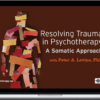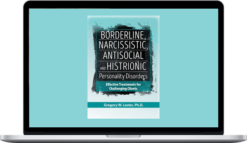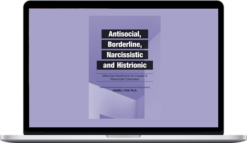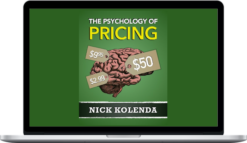NICABM – How to Work With Perfectionism
$197.00 $22.00
Total Sold: 1
»Instant Delivery
Description
NICABM – How to Work With Perfectionism
How to Work with the Fear, Pain, and Shame That’s Imprisoning Your Client in Perfectionism
Perfectionism can keep a client stuck in a pervasive anxiety.
Problem is, perfectionism can look like a good thing to the client – on the surface anyway. It often provides them with success, approval, and sometimes even a sense of mastery.
But it’s also grooving their brain into rigid black-and-white thinking. Not only that, it can lead to depression, paralyze their ability to make choices, and poison their most loving relationships.
Eventually, they’re left dealing with chronic stress, a loss of connection, and a nervous system that can’t come down off the ledge.
So how do we help clients achieve their goals without the harsh self-critical drive that’s damaging their mind and body?
We asked the top 26 experts in the world how they work with a client’s perfectionism. We gathered their best strategies into this course . . .
What You’ll Learn In How to Work With Perfectionism
How to Work with a Client’s Perfectionism
The Neurobiology of Perfectionism
Dan Siegel, MD Kelly McGonigal, PhD
- A mapping framework to help clients identify perfectionism patterns
- What goes on in a perfectionist’s brain and how it can create a self-made prison
- Why a perfectionist’s brain is highly optimized for detecting error
Perfectionism’s Cost: Helping Clients See the Hidden Damage Under Perfection’s Rewards
Deany Laliotis, LICSW Melanie Greenberg, PhD
Stan Tatkin, PsyD, MFT Zindel Segal, PhD
Judson Brewer, MD, PhD Kelly McGonigal, PhD
- The most powerful driver of perfectionism (and why clients so desperately cling to it)
- Why your client will often reject the idea that perfectionism is hurting them
- Two toxic factors that can set a perfectionist up for depression
- Why perfectionism so often presents with disrupted sleep
Why Perfectionism Turns to Addiction and How to Help Clients Break Free
Judson Brewer, MD, PhD Ron Siegel, PsyD
Michael Yapko, PhD Joan Borysenko, PhD
- The addiction pattern that keeps many clients locked in a drive for perfection
- The perfectionist paradox: one way perfectionism actually promotes failure
- A core missing skill that can keep a client addicted to perfection
How to Work With Shame and Perfectionism
Pat Ogden, PhD Ron Siegel, PsyD Deany Laliotis, LICSW
Richard Schwartz, PhD Melanie Greenberg, PhD Rick Hanson, PhD
- How perfectionism helps fuel a person’s feeling of “never good enough”
- One powerful strategy to foster the inner compassion that can reduce shame
- One approach for working with the painful feelings beneath perfectionism
- How to defuse an inner critic that’s driving your client’s perfectionism
How to Work with Clients Paralyzed by Their Perfectionism
Shelly Harrell, PhD Steven Hayes, PhD Ron Siegel, PsyD
- Why your client’s procrastination might be a hidden form of perfectionism
- How perfectionism can shift clients from motivation to paralysis
- The critical cost to a client who suffers perfection-driven paralysis
How to Target Deeply Engrained Patterns of Perfectionism
Stephen Porges, PhD Bonnie Goldstein, LCSW, EDM, PhD
Deb Dana, LCSW
- The crucial link between perfectionism and early life attachment
- The core vulnerability that can lead to an obsession with perfection
- How a client can get trapped in a perfection-isolation loop
How to Work with Perfectionism That’s Linked to Trauma
Resmaa Menakem MSW, LICSW, SEP Onno van der Hart, PhD
Ron Siegel, PsyD
- How trauma strengthens the one core element that gives perfectionism its power
- Why trauma-driven perfectionism can often be mis-assessed as a personality trait
Key Strategies for Working with Obsessive Compulsive Disorder and Perfectionism
Pat Ogden, PhD Bill O’Hanlon, LMFT
- How to help clients manage the OCD that’s keeping their perfectionism alive
- A brain-based approach to treating hyperarousal triggered by perfectionism
- One technique to help a perfectionist safely experience mistakes
How to Help Clients Shift a Rigid Perfectionist Mindset
Zindel Segal, PhD Lynn Lyons, LICSW Michael Yapko, PhD
- One crucial reason a client will hold onto perfectionism (even when it’s costing them)
- How to help clients soften their rigid perfectionistic boundaries
- How an overachiever will often assess imperfection (and why this keeps them stuck)
About NICABM
We proudly provide continuing education for practitioners who are dedicated to being the best in their craft. Our goal is to develop programs that connect you with the top experts and the latest strategies in the field, to help you achieve better outcomes, more quickly with each of your clients.
About Ruth Buczynski, PhD
Dr. Ruth Buczynski is a licensed psychologist and founder and president of The National Institute for the Clinical Application of Behavioral Medicine (NICABM). NICABM helps physicians, nurses, psychologists, social workers, and counselors – practitioners who have some of the most significant and life-changing missions on the planet – provide cutting-edge, research-based treatment strategies to their patients. For more than 35 years, NICABM has offered accredited training and professional development programs to thousands of practitioners worldwide.
More courses from the same author: NICABM
Delivery Policy
When will I receive my course?
You will receive a link to download your course immediately or within 1 to 21 days. It depends on the product you buy, so please read the short description of the product carefully before making a purchase.
How is my course delivered?
We share courses through Google Drive, so once your order is complete, you'll receive an invitation to view the course in your email.
To avoid any delay in delivery, please provide a Google mail and enter your email address correctly in the Checkout Page.
In case you submit a wrong email address, please contact us to resend the course to the correct email.
How do I check status of my order?
Please log in to HealingCourse account then go to Order Page. You will find all your orders includes number, date, status and total price.
If the status is Processing: Your course is being uploaded. Please be patient and wait for us to complete your order. If your order has multiple courses and one of them has not been updated with the download link, the status of the order is also Processing.
If the status is Completed: Your course is ready for immediate download. Click "VIEW" to view details and download the course.
Where can I find my course?
Once your order is complete, a link to download the course will automatically be sent to your email.
You can also get the download link by logging into your HealingCourse account then going to Downloads Page.
Related products
Total sold: 2
Total sold: 1
Total sold: 1









